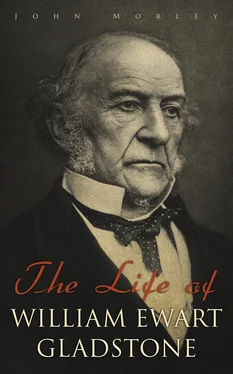I have one other early recollection to record. It must, I think, have been in the year 1815 that my father and mother took me with them on either one or two more journeys. The objective points were Cambridge and London respectively. My father had built, under the very niggard and discouraging laws which repressed rather than encouraged the erection of new churches at that period, the church of St. Thomas at Seaforth, and he wanted a clergyman for it. 4Guided in these matters very much by the deeply religious temper of my mother, he went with her to Cambridge to obtain a recommendation of a suitable person from Mr. Simeon, whom I saw at the time. 5I remember his appearance distinctly. He was a venerable man, and although only a fellow of a college, was more ecclesiastically got up than many a dean, or even here and there, perhaps, a bishop of the present less costumed if more ritualistic period. Mr. Simeon, I believe, recommended Mr. Jones, an excellent specimen of the excellent evangelical school of those days. We went to Leicester to hear him preach in a large church, and his text was ' Grow in grace .' He became eventually archdeacon of Liverpool, and died in great honour a few years ago at much past 90. On the strength of this visit to Cambridge I lately boasted there, even during the lifetime of the aged Provost Okes, that I had been in the university before any one of them.
I think it was at this time that in London we were domiciled in Russell Square, in the house of a brother of my mother, Mr. Colin Robertson; and I was vexed and put about by being forbidden to run freely at my own will into and about the streets, as I had done in Liverpool. But the main event was this: we went to a great service of public thanksgiving at Saint Paul's, and sat in a small gallery annexed to the choir, just over the place where was the Regent, and looking down upon him from behind. I recollect nothing more of the service, nor was I ever present at any public thanksgiving after this in Saint Paul's, until the service held in that cathedral, under my advice as the prime minister, after the highly dangerous illness of the Prince of Wales.
Before quitting the subject of early recollections I must name one which involves another person of some note. My mother took me in 181—to Barley Wood Cottage, near Bristol. Here lived Miss Hannah More, with some of her coeval sisters. I am sure they loved my mother, who was love-worthy indeed. And I cannot help here deviating for a moment into the later portion of the story to record that in 1833 I had the honour of breakfasting with Mr. Wilberforce a few days before his death, 6and when I entered the house, immediately after the salutation, he said to me in his silvery tones, 'How is your sweet mother?' He had been a guest in my father's house some twelve years before. During the afternoon visit at Barley Wood, Miss Hannah More took me aside and presented to me a little book. It was a copy of her Sacred Dramas , and it now remains in my possession, with my name written in it by her. She very graciously accompanied it with a little speech, of which I cannot recollect the conclusion (or apodosis), but it began, 'As you have just come into the world, and I am just going out of it, I therefore,' etc.
I wish that in reviewing my childhood I could regard it as presenting those features of innocence and beauty which I have often seen elsewhere, and indeed, thanks be to God, within the limits of my own home. The best I can say for it is that I do not think it was a vicious childhood. I do not think, trying to look at the past impartially, that I had a strong natural propensity then developed to what are termed the mortal sins. But truth obliges me to record this against myself. I have no recollection of being a loving or a winning child; or an earnest or diligent or knowledge-loving child. God forgive me. And what pains and shames me most of all is to remember that at most and at best I was, like the sailor in Juvenal,
digitis a morte remotus,
Quatuor aut septem; 7
the plank between me and all the sins was so very thin. I do not indeed intend in these notes to give a history of the inner life, which I think has been with me extraordinarily dubious, vacillating, and above all complex. I reserve them, perhaps, for a more private and personal document; and I may in this way relieve myself from some at least of the risks of falling into an odious Pharisaism. I cannot in truth have been an interesting child, and the only presumption the other way which I can gather from my review is that there was probably something in me worth the seeing, or my father and mother would not so much have singled me out to be taken with them on their journeys.
I was not a devotional child. I have no recollection of early love for the House of God and for divine service: though after my father built the church at Seaforth in 1815, I remember cherishing a hope that he would bequeath it to me, and that I might live in it. I have a very early recollection of hearing preaching in St. George's, Liverpool, but it is this: that I turned quickly to my mother and said, 'When will he have done?' The Pilgrim's Progress undoubtedly took a great and fascinating hold upon me, so that anything which I wrote was insensibly moulded in its style; but it was by the force of the allegory addressing itself to the fancy, and was very like a strong impression received from the Arabian Nights , and from another work called Tales of the Genii . I think it was about the same time that Miss Porter's Scottish Chiefs , and especially the life and death of Wallace, used to make me weep profusely. This would be when I was about ten years old. At a much earlier period, say six or seven, I remember praying earnestly, but it was for no higher object than to be spared from the loss of a tooth. Here, however, it may be mentioned in mitigation that the local dentist of those days, in our case a certain Dr. P. of —— Street, Liverpool, was a kind of savage at his work (possibly a very good-natured man too), with no ideas except to smash and crash. My religious recollections, then, are a sad blank. Neither was I a popular boy, though not egregiously otherwise. If I was not a bad boy, I think that I was a boy with a great absence of goodness. I was a child of slow, in some points I think of singularly slow, development. There was more in me perhaps than in the average boy, but it required greatly more time to set itself in order: and just so in adult, and in middle and later life, I acquired very tardily any knowledge of the world, and that simultaneous conspectus of the relations of persons and things which is necessary for the proper performance of duties in the world.
I may mention another matter in extenuation. I received, unless my memory deceives me, very little benefit from teaching. My father was too much occupied, my mother's health was broken. We, the four brothers, had no quarrelling among ourselves: but neither can I recollect any influence flowing down at this time upon me, the junior. One odd incident seems to show that I was meek, which I should not have supposed, not less than thrifty and penurious, a leaning which lay deep, I think, in my nature, and which has required effort and battle to control it. It was this. By some process not easy to explain I had, when I was probably seven or eight, and my elder brothers from ten or eleven to fourteen or thereabouts, accumulated no less than twenty shillings in silver. My brothers judged it right to appropriate this fund, and I do not recollect either annoyance or resistance or complaint. But I recollect that they employed the principal part of it in the purchase of four knives, and that they broke the points from the tops of the blades of my knife, lest I should cut my fingers.
Where was the official or appointed teacher all this time? He was the Rev. Mr. Rawson of Cambridge, who had, I suppose, been passed by Mr. Simeon and become private tutor in my father's house. But as he was to be incumbent of the church, the bishop required a parsonage and that he should live in it. Out of this grew a very small school of about twelve boys, to which I went, with some senior brother or brothers remaining for a while.
Читать дальше









![William Frith - John Leech, His Life and Work. Vol. 1 [of 2]](/books/747171/william-frith-john-leech-his-life-and-work-vol-thumb.webp)


![William Frith - John Leech, His Life and Work, Vol. 2 [of 2]](/books/748201/william-frith-john-leech-his-life-and-work-vol-thumb.webp)